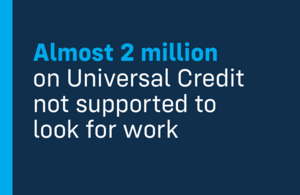Almost two million people on Universal Credit not supported to look for work
Number of people onreceiving the highest ratelevel of Universalsupport Creditacross UC and withother nobenefits increasing support50% tosince lookthe forstart workof hasthe almostpandemic, quadrupledrising sinceabove the pandemic
projections.


- Figures show 1.8 million people now in Limited Capability for Work Related Activity (LCWRA) category as broken Work Capability Assessment continues to push people out of
workwork. - New figures emerge ahead of proposals to reform health and disability benefits and builds on the plan to get Britain
workingworking.
1.8 million people on Universal Credit are getting no support to find work, according to new data out today (Thursday 13 March).
TheWhilst numberan hasincrease almostwas quadrupledexpected, sinceas the start of the pandemic when 360,000 people weremove consideredfrom tooother sickbenefits to lookUniversal forCredit, workthe – a 383% rise inhas lessincreased thanabove fiveexpectations, years.with In the last year alone, the number hasof risen by from 1.4 million people toreceiving 1.8the million.
Thehighest numberlevel of youngsupport peopleacross aged 16 to 24 on LCWRAUC hasand risenother bybenefits increasing 249%50% from 46,000 to 160,000 since the pandemicstart –of demonstrating a worrying increase in the numberpandemic, peoplebetween becomingFebruary trapped2020 inand inactivityAugust early in life, with almost one million young people not in education, employment, or training.2024.
The government is already taking action to get people into work through its plan to get Britain working which will empower local mayors to tackle economic inactivity, overhaul Jobcentres, and deliver a Youth Guarantee so every young person is either earning or learning.
Building on the biggest employment reforms for a generation, Work and Pensions Secretary Liz Kendall is due to announce radical welfare reforms to create a thriving and inclusive labour market - as part of the government’s Plan for Change to unlock work, boost growth and raise living standards.
Work and Pensions Secretary, Rt Hon. Liz Kendall MP, said:
Millions of people have been locked out of work by a failing welfare system which abandons people - when we know there are at least 200,000 people who want to work, and are crying out for the right support and a fair chance.
This government is determined to fix the broken benefits system we inherited so it genuinely supports people, unlocks work, boosts living standards while putting the welfare bill on a more sustainable footing.
In the current dysfunctional system, a person is placed in binary categories of either “fit for work” or “not fit for work” through the Work Capability Assessment (WCA) – an assessment the government has said it will either reform or replace, so it no longer drives people who want to work to a life on benefits.
Through this process, those not fit for work are told they have Limited Capability for Work Related Activity (LCWRA) – meaning they won’t receive employment support or further engagement from the system at any point following their assessment – effectively abandoning and locking them out of work indefinitely.
The current system, in which people 25 and over on the standard rate of UC get £393.45 a month and those with a health condition get an additional £416.19, gives an incentive for people to say they can’t work – and get locked out of help and support – simply to get by financially.
Over the past five years, 67% of people on Universal Credit who have been through a WCA were considered LCWRA - a symptom of the assessment system pushing people to prove their inability to work for a more generous payout.
The government has hit the ground running to tackle health-related inactivity at its root, improving the country’s wellness by investing £26 billion in the NHS, delivering 2 million extra appointments to tackle medical waiting lists, and hiring an extra 8,500 mental health workers, so people get the treatment they need to stay healthy and in work.
This comes alongside the £250 million plan to get Britain working and the recently announced 1,000 Work Coaches will be redeployed to offer intensive employment support to around 65,000 sick and disabled people - a ‘downpayment’ on our plan to restore fairness to our welfare system.
Further Information
- While a rise in LCWRA cases was anticipated for reasons including people moving from legacy benefits onto Universal Credit, it has surged far beyond projections.
- 70% of the increased caseload - across UC and legacy benefits - in the past five
yearsyears cannotwasbenotexplainedexpectedthedemographicDepartment,or policy changes, and comes as the UK remains the only country in the G7 that has higher levels of economic inactivity now than before the pandemic. - Decomposition of growth in the number of claimants of Universal Credit with Limited Capability for Work and Work-Related Activity, or in the Employment and Support Allowance Support Group - GOV.UK
- DWP Stat-Xplore: UC WCA caseload dataset (UC LCWRA), ESA caseload dataset (ESA Support Group). February 2020 to August 2024 shows a 50.7% increase in caseload.
- This Press Notice has been revised, clarifying the figures related to increased UC LCWRA caseload.
Updates to this page
-
This Press Notice has been revised, clarifying the figures related to increased UC LCWRA caseload.
-
First published.
Update history
2025-04-01 16:24
This Press Notice has been revised, clarifying the figures related to increased UC LCWRA caseload.
2025-03-13 15:06
First published.